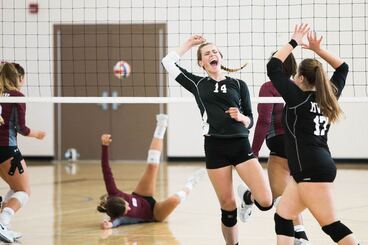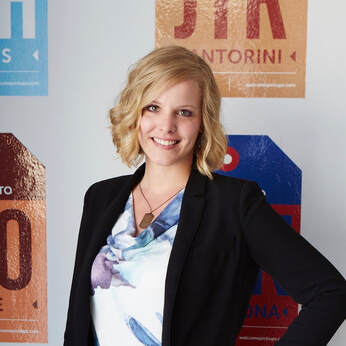 Photo by Vince Fleming on Unsplash Photo by Vince Fleming on Unsplash This past weekend, I had the extreme good fortune to see Hillary Rodham Clinton and Chelsea Clinton on the tour for their new book, Gutsy Women. Normally, when figures like HRC and Chelsea come to town, they appear on a well-lit stage at a beautiful theater in San Francisco, or at an arena in San Jose. But this time, they came to my local high school, and settled into a few chairs on a platform in the school gymnasium. And because we live down the street, we got there early enough to score seats in the third row. Well, I should say, my friends got me a seat in the third row; I was editing essays at a coffee shop nearby. This book functions as a kind of peek at the conversations Hillary and Chelsea have been having for decades about the women who mean something to them, from activists like Claudette Colvin to first lady Betty Ford to actress and inventor Hedy Lamarr. And in between the stories of these compelling women, they shared their co-writing process and the pleasure of writing something so personal with a woman they respect and admire so much. At one point, the conversation turned to Title IX and Chelsea shared a shocking statistic. She explained that in 1972, the year that Title IX first passed, only 700 girls played soccer in schools. Compare that to today, when 390,000 girls are playing soccer in programs that exist almost solely because of this mandate. I have to imagine that a shift that significant would have consequences in other areas, and it got me thinking about the role that competitive sports play in preparing us for work and careers. A 2014 Cornell University study found that “past participation in competitive team sports marks you as a winner in the competition for better jobs.” In a survey of current workers, high school athletes were believed to more likely be self-confident adults with good leadership abilities, in comparison to kids who played in the school band or worked on the yearbook. A 2013 survey from Ernst & Young found that 96% of women who work at the C-suite level played sports as kids. And additional research states that “one out of every two women who make $75,000 or more identifies themselves as an athlete.” There’s also good reason to expect that student-athletes learn important lessons that translate to professional success, like working well with others, setting a goal and sticking with it even when things don’t go the way you’d hoped, and managing the demands of school and your sport. Basically all the things I tell my students to avoid writing about in their college essays. But they’re clichés for a reason – kids really do learn these lessons from playing sports. And the best part is that it doesn’t matter whether you’re any good at your chosen sport – benchwarmers and team captains alike get the same benefits. So whether you’re motivated by the prospect of a better job down the line, or a structured way to be active and social, or you genuinely love participating in a particular sport, the way you get there is the same: go out and play.
0 Comments
 Photo by Roman Mager on Unsplash Photo by Roman Mager on Unsplash When I was in college, I took a couple classes with a brilliant Shakespeare scholar named Suzanne Gossett. As a new, baby freshman, I found her seminars intimidating, but I was also inspired to rise to her level. When I worked up the courage to raise my hand and share my point of view on a particular soliloquy, she walked over to my desk, flipped open my Norton Shakespeare anthology, and said, “Prove it.” Those two words still make me break out in a sweat to this day, but if you could solidly make your case and support your opinion with evidence from the text, Professor Gossett would look down at you and say, “Good for you.” It was the BEST. I spend a lot of time reassuring my students that part of the thing that makes college essays so challenging is that they’re totally different from the type of writing you do for your academic classes. It’s about your personal experiences, your background, your stories. It’s not about scholarly articles and quotations from novels. But as I read through my students’ essays, I find myself recalling Prof. Gossett’s words. When a student tells me that they like a particular school’s strong alumni network and believe that that will help them get a job after graduation, I think to myself, “Prove it.” How do you know that this school has a strong alumni network? And what evidence do you have that that network will ultimately be helpful when you graduate and start building your career? It’s one thing to make these declarations, but it’s much more powerful if you can support it with actual evidence. So even though you’re writing about your personal beliefs and experiences, you still have to support those beliefs with evidence. In the case of college essays, that evidence means sharing anecdotes and stories that illustrate the point you’re trying to make. It’s not enough to tell a college that you’re fascinated by the intersection of English and history. You have to tell them a story about how you wrote your IB Extended Essay on the ancient tradition of revenge killings and how that plays out in the Old English epic poem Beowulf. It’s not enough to tell a college that you felt a sense of welcome and community when you visited the campus. You have to tell them about your conversation with Daniel, a poli sci and communications major, who spent 20 minutes talking to you about the process of double majoring and then gave you some recommendations for where to have lunch on campus. Yes, writing a college essay is very different from writing a research paper for your English class. You get to use first-person pronouns and make the occasional joke. But it’s not enough to just make declarations about who you are and what you care about. You have to prove your point.  Amber Francis is a marketing consultant for EcoVadis, working remotely and traveling full-time. Our paths crossed in Palermo, Sicily, and I was immediately impressed by Amber’s confidence as she moved through a new city. That confidence makes perfect sense to me after hearing Amber’s story, a story that emphasizes her innate independence and eagerness to take initiative to reach her goals. Our conversation has been edited for length and clarity. When you were 17, what did you want to be? Honestly, I wanted to practice law. It was the only way I could see out of the situation I was in. The way I grew up, the options were: you could be a wife and mother and that was it. You could be a schoolteacher or a secretary before that, like in waiting to be a wife or mother. However, I knew these Christian attorneys, and I thought, “Oh, that's something I could do that's not these other two options. I want to do that.” They had come to our church in the past as special speakers about religious rights and helping the church figure out how to advocate for themselves in U.S. and they represented pastors who were involved in scandals. So it was very early on when I thought no, just marriage and kids – that’s definitely not for me. I actually interned at a law firm in Florida for a summer before I went to college. I thought that I could do this as a woman, even though all the women at that law firm were paralegals, not attorneys. And the two women I saw at that law firm were both single, so there was no requirement for the child and family thing. And they were all in their mid-thirties. So I thought, “Okay, maybe I could do this.” And I got to go to Florida, so that was cool. How did you decide to attend West Coast College? Growing up, we were pretty conservative and we went to church all the time. As I got older, it got gradually worse and the church figures were more dynamic, like the sort of figures you think of in a cult. And it was a very, very one-way street as far as education goes. Nothing was tolerated. The school that offered the law program was Christian, but it wasn’t conservative enough for my parents. So I ended up going to a really conservative school and I just agreed to everything because I wanted to leave. It wasn't until three or four years after college that I realized I could have gone to any school I wanted and gotten a scholarship. But I had no idea that was an option. Our dress code at West Coast was very, very strict. We had to wear pantyhose every single day in the desert. And it was freaking hot. And it was really windy, so we weren't allowed to wear full skirts. But your skirt couldn't be too tight because then it would show your form. You had to sign out every single time you left the campus and then say what time you were going to be back, and if you weren't back in time you got a demerit. And we'd have Bible study every day of the week. It was like rules upon rules. How did you choose your major? My school had church counseling, obviously, and missionary studies. They had a secretarial path and teaching, of course. I took a lot of counseling classes, as many as I could basically. There was one level that only men could take, so I took the three that girls were allowed to take. Those were my favorite classes. I took a lot of coaching classes like volleyball and basketball coaching. And I took a lot of electives, basically, toward a general degree in communications. Once I got out of the house and had access to information - even though it was still very limited – I realized I had so many more options. And then I didn't know what I wanted to do, because I wanted to do everything. And I'm still like that. I still want to do everything, to learn everything. Maybe it was the result of not having options as a kid, so now I want to do all of them. How did you get from college to where you are now? I graduated in 2008 in the middle of the crash and it was really hard to find a job in California. I looked, and it was terrible. So I went online, and I joined a nanny organization. They called me and did an interview and then sent my profile to families, and I could view their profiles as well. I got chosen to come and live with this family in New York and be their nanny. I went for about three months, and it was really terrible. After three months, the director of the agency told me to leave. And so I did. Almost immediately, she placed me with a family in DC, and I was their nanny for a year. They have three boys, and they’re like my DC family now. While I was their nanny, I was also interning at a local magazine and at an ecommerce site. I did mostly content writing and then social media stuff. That was right at the beginning of companies figuring out that they could be on social media and reach customers. I got into that and I learned a lot about SEO and basically taught myself my job. I started consulting, and after the year with that family, I told them I wasn’t going to renew again. I wanted to try this thing on my own. When I first went to DC, I knew no one. I had been on Twitter very off and on. But then I realized that there was actually a really big community around social media, And it was still so new that everyone was buzzing about it. So I started going to meetups on Twitter, a tweetup is what they called them. And in the evenings, I would go into DC to networking events, not even for the purpose of jobs. I just wanted to meet people. And I think every job that I've had in DC has come out of that community. So I ended up doing consulting for about a year and a half, and then this guy that I had met through Twitter was working for this political consulting firm, and he said, “We need someone.” So I started working with them in a regular, full-time role. doing the same thing for a company. I did that for a little less than a year, and I realized that politics is not for me. And then again, a woman I met through Twitter was a recruiter for Marriott. She said, “We have these positions open, and they're hiring like crazy,” and it was almost double my salary, which was insane for DC. It was a totally new group that they were starting from the ground up. So I worked for hotels in the Paris and London markets for about a year. After that, I moved on to the Middle East and Asia markets. We started small, and as it expanded, I just did the same things for each market. I would talk to web directors and marketing directors and event planners and get all of their online and offline marketing efforts coordinated. I did a lot with their SEO and their websites, a lot of recording. Now that I think back, I was doing the job of like four different teams. They've since noticed that it’s a lot of work, and they have divided that job into subject matter experts. Then I applied to a university in Florida to study human factors engineering. Basically, it’s a way of solving problems that takes psychology and engineering and marries the two. So, a good example is when they built this plane that had two knobs. The pilots kept crashing this plane, so they brought in a human factors person who watched how people used the knobs, they observed and they asked questions, and they realized it was a simple enough fix to change it from a round knob to a square knob. It’s solving simple problems like that but in ways that take psychology into account, considering what people are actually thinking and how they use an object or a system or a space. So I got accepted to Embry-Riddle University, but I got denied for financial aid. I thought maybe I could work full-time for Marriott so I could pay for it, but they said no. So, okay, plan B. I liked working with the hotel. I did a lot of volunteering with Marriott’s corporate social responsibility team and the HR culture team. I did some training in the UX departments, and just kept myself busy outside of what I was doing. But still, it was so corporate, and it was not moving fast enough for me. So I asked if I could work remotely. All of my clients were in East Asia, and I could literally go a week without talking to anyone in my office. I would work from home pretty often because I'd have calls at 4:00 a.m. I put together the hours that I worked, when I got emails, like my typical day, week, month. I laid it all out and presented it to them. But they said, “No. We need you in the office. We need to see you sitting at your desk.” Then I found this course on design thinking at the Institute of Design in Chicago, and signed up for it with Marriott’s allotted learning budget. I had the course a month later, and then I went back to them and asked to go remote again. And they said no again. So I found this really obscure thing in Marriott's HR system, and I asked for a sabbatical, but they said no. So I gave them my two weeks notice. I found out that a year after I left, they moved everyone in my department to remote, which is fine. And then maybe a month after I quit, I started traveling. I wanted to test it out and see if I liked traveling full time. So for six months, I volunteered at a few places but I didn't do any work work. And after that six months, I realized I like doing this, I want to travel full time. The family that I had nannied for in DC, the mom knew I was a consultant and she was starting this new company and needed help in my area. So I interviewed and they hired me as a consultant for a year. Then they asked if I could come on full time, so I've been full-time with that company since January. So things just came full circle. And they don’t care about me working remotely – our team is so spread out, it doesn’t matter. Looking back, what seems clear to you now? I always tell people to volunteer more; it’s still work, and it still looks good on a resume. And also, take advantage of all the available learning programs. Most companies have a budget for continuing education, so you can take classes or they’ll send you to conferences, things like that. Always max that out 100%. I've done that every year at every company I've worked for, and I’ve advanced my career because of that. Like, I wanted to learn more, so I took an SEO course, which allowed me to get another job because I was certified in this specialty field. And then I took other courses at that company. So every year, learn something new, even if you’re an intern. Always take advantage of that. Mostly, I wish I had known that there were other options. Like, I didn't have to go to this one school. And you don't have to be one thing for the rest of your life. In our society, people can have new careers every ten years. You can change fields at 40 and then again at 50 and that's okay. It sort of goes with the human factors/design way of thinking; you try something and then you come back and iterate and then you try something new and you iterate and so on. And there is merit in just trying something.  Photo by Olia Gozha on Unsplash Photo by Olia Gozha on Unsplash As an essay specialist, I spend a lot of time thinking about essay prompts: the good, the bad, and the…well…odd. But my favorite essay prompts, hands-down, are the quick-takes. Schools like Chapman, USC, and Elon ask kids to answer a range of questions in a word, a phrase, or a sentence. Questions like “If you could create a food truck, what type of food would you serve? Name the truck,” elicit great responses like a sandwich truck named “On a Roll,” or a fried chicken stand called “Frying for Help.” Ugh, god bless teenagers and their puns. And the prompt, “Name three songs from your perfect playlist,” seems like a genius way for admissions officers to fill out their travel playlists. As an editor, I rarely say anything about these responses aside from, “Great choice!” But the question that almost always requires an additional – or five – rounds of editing is the question, “Name three words that describe you.” I think the first mistake kids make is that they read this question as, “Name the three words that best describe you out of all the possible words in the world.” And of course, if you were choosing the three things that are the most fundamentally significant and definitive of who you are, you would land on adjectives like compassionate, hardworking, and curious. And all of those things would ultimately be true. But they’re also true of most of the people applying to college, and, frankly, most of the people, period. The point of this question, as with every essay question, is to tell the reader more about who you are as a unique and dynamic individual. And in this case, the best way to do that is not to share the three words that most accurately encompass your spirit, but rather three words whose combination equals the funky and rare creature that you are. For example, I had a student who was an identical twin describe himself as “wingman,” which was a perfect way to sum up a life spent alongside another person, in competition and in cahoots. Or a kid who described himself as a “fungiphile,” which fit perfectly with his interest in science and his essay about the summer he spent studying food chemistry. Or a young woman who branded herself a “chai-addict,” which didn’t connect to the larger story she was telling, but definitely made me want to meet up with her to drink chai. Of course, there’s no way to fully articulate yourself in three words, so don’t try to do that. Instead, give the reader three more reasons to find you interesting, three more details to round out everything you’ve already told them, three more opportunities to laugh out loud in the coffee shop where they’re reading application files. Not trying to cram every aspect of your personality into three words is, ironically, the best way to actually make yourself stand out. So I’ll leave you with the best advice I can give you, the three words that really encompass everything I’ve shared: just be yourself. |
What is the When I Was 17 Project?When I Was 17 is a blog series dedicated to collecting the varied stories of people's career paths, what they envisioned themselves doing when they were teenagers and how that evolved over the course of their lives. I started this project with the goal of illustrating that it's okay not to know exactly what you want to do when you're 17; many successful people didn't, and these are a few of their stories.
Archives
October 2020
|